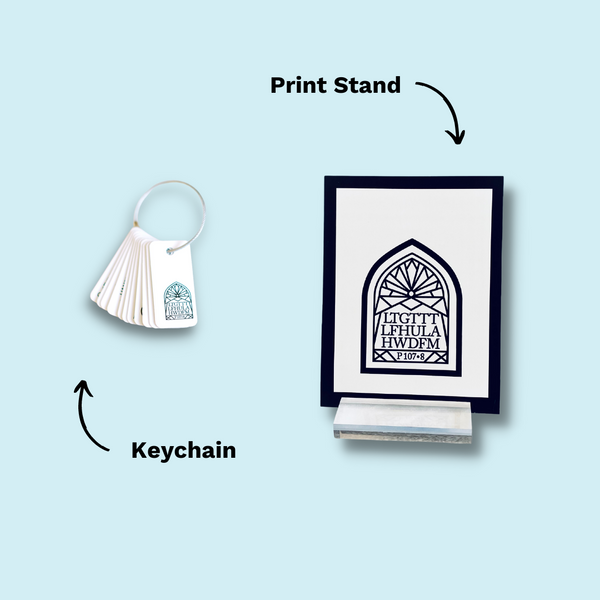do not merely listen to the word, and so deceive yourselves. do what it says. — James 1:22
Our verse this month keeps checking me—not “checking in” on me, but checking me. Like a hockey player. It’s a brute force kind of reminder that while I want to do what I should, I simply don’t always do it. All of my good intentions just don’t always materialize into right, intentional living. And even when I actually do what God is calling me to do (like our verse says), I often “peter out” on my follow through. In this season of Lent, I’m reminded of a recent lenten season where I totally skidded out on my resolution to give something up. I had all the good intentions of doing it, but when the rubber met the road, I simply did not do what I intended. And sadly, I ended up wishing I hadn’t made that commitment at all.
I wonder if any of this is resonating with you?
What do we do when we realize that our actions simply don’t meet up with our intentions? Do we tuck our tails in shame and try to just forget about it? Do we need to simply try harder or make a better plan? As I was thinking about this conundrum, I was reminded of a story that Jesus told:
“What do you think? There was a man who had two sons. He went to the first and said, ‘Son, go and work today in the vineyard.’
“‘I will not,’ he answered, but later he changed his mind and went.
“Then the father went to the other son and said the same thing. He answered, ‘I will, sir,’ but he did not go.
“Which of the two did what his father wanted?” (Matthew 21:28-31)
It’s a story about intentions versus actions—a story Jesus told the religious leaders of his day to expose their disingenuous hearts. It’s a story that asks us to consider our own hearts too. It’s a story that begs us to answer this question:
Which son are you more like?
Are you more like the first son? Do you tend to drag your feet when God asks something of you? Do you say no because you don’t have the time or feel underqualified or just plain old don’t want to do it, but then feel convicted and do it anyway? Does your obedience tend to be reluctant? Or, are you more like the second son? Do you tend to give God lip service without actually following through? Can you hear yourself making hollow promises to God about how you’re going to be better about this kindness or give up that sin? Can you relate to the intention without the intentionality of that second son?
I wonder if you relate to both?
I do. There are times when I am for sure the first son, when I say no and feel the holy conviction of the Spirit, making me relent from my own way and do what God is asking of me. But there are other times (like my lenten failure) when I give God hollow words with no follow through. Whatever your general response, I have one more question, the central question this story begs us to answer:
Where is your heart?
It’s the question Jesus was asking the Pharisees and the question he is asking us. Let me explain. The two responses of these sons reveal their hearts towards their father. The first son says, “no,” but somehow arrives at obedience. Which forces us to consider what must’ve happened to his heart in the meantime. He must have wrestled with his answer. He must have regretted it. And though his initial response displays an unwilling and disobedient heart, his ultimate actions show a willing obedience that reflects a soft and repentant heart. In the second son, we see someone who gives a good answer but has no good follow through. And again, we have to wonder what was going on in his heart. Perhaps, he truly intended to do what his father asked, but in the end, he simply didn’t care enough about his father to do what he asked. So while he might say that he loves his father and he might even think he loves his father, he is in fact self-deceived. Like our verse this month tells us, he has deluded himself into thinking he’s alright, but in reality, his actions betray him. His actions reveal a heart that’s hard and unrepentant towards his father. Jesus tells the Pharisees this particular story to reveal how they’ve been like the second son, while they may have the appearance of goodness, their hearts are actually far from the Heavenly Father.
This gives my own heart pause.
Maybe it isn’t such a small thing to have an unwilling heart. Maybe it’s a big thing. Maybe it isn’t a benign thing to be self-deceived about my relationship with God, maybe it’s a very dangerous thing. Maybe, I’m a whole lot more like the Pharisees than I’d like to admit. Our verse and this story show us that our actions are a very real litmus test of our hearts, and when they are off track, we should take notice. This is the brute force reminder in our verse. Our actions really do betray our hearts, which is a good and sober reality. This verse does and should hit us like a rebuke at times.
Which brings us full circle.
We’re back to our original question: What do we do when we face the hard reality of our actions not meeting up with our intentions? Do we need to try harder? Do better? If we keep reading our story, we find the answer. After Jesus tells this story to the Pharisees, he doesn’t rebuke them for their sin and tell them to do better. Instead, he rebukes them because they did not believe in “the way of righteousness.” He tells them that the prostitutes and the tax collectors (i.e. the biggest sinners) are the ones getting it right, because they’re the ones who confess their sins and believe in him. So the answer to our failures isn’t trying harder, but repenting and believing Jesus for his righteousness. Unlike the two sons in his story, Jesus is the perfect Son. He did everything his Father required and earned our righteousness through his obedience (Romans 5:19). So, when we find our actions are falling short of God’s intention for our lives, we can trust in the perfectly righteous Son who pleased the Father on our behalf. And when our hearts are softened by the overwhelming grace of Jesus, how can we not then change our behavior? Moreover, we know that the perfect Son has given us his own perfect Spirit to empower us to walk in his good ways. Surely, “his divine power has given us everything we need for a godly life” (2 Peter 1:3).
Want to know more about the power of God at work in us? Read Weak but Willing.
Thanks for reading, Natalie

Meet Natalie,Dwell co-founder
Hi there, I'm Natalie. I'm so glad you're here. I'd love to connect with you and hear more about what God is doing in your life!
🎧 ON THE PODCAST: Do You Really Believe God's Word? // Tara Sun




